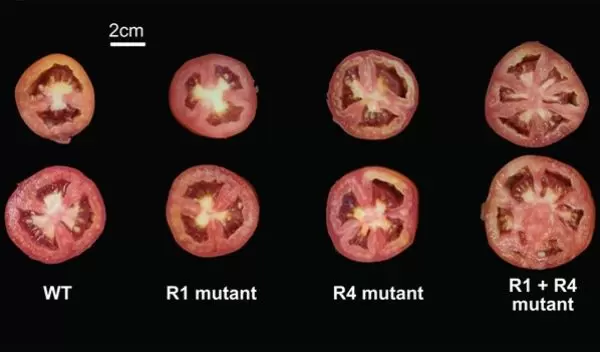
The influence of genetic variations
Both people and tomatoes come in different shapes and sizes. That's because every individual has a unique set of genetic variations -- mutations -- that affect how genes act and function. Added together, millions of small genetic variations make it hard to predict how a particular mutation will impact any individual.
Cold Spring Harbor Laboratory and Howard Hughes Medical Institute scientist Zach Lippman has shown how genetic variations in tomatoes can influence the way a specific mutation affects the plant. He is working toward predicting the effects of mutations on tomato varieties. The results are published in the journal Nature Plants.
In the U.S. National Science Foundation-funded research, Lippman and his team used CRISPR, a targeted gene-editing tool, on two tomato genes that control fruit size: SlCV3 and SlWUS. The scientists generated more than 60 tomato mutants by removing pieces of DNA in promoter regions, areas near genes that control their expression. In some cases, individual mutations increased the size of the tomatoes by a little bit. Some pairs of mutations did not change fruit size. A few synergistic combinations caused a dramatic, unpredicted increase in fruit size.
"The Holy Grail for crop breeding is predictability," Lippman says. "If I mutate this sequence, I'm going to get this effect -- because there is this sea of other variants nature has accumulated near the mutation you're engineering, as well as scattered throughout the genome, many of which could be influencing the specific mutation you're creating."
Lippman and his team will continue quantifying how individual and combined mutations affect certain crop traits. So far, they have measured interactions between two individual mutations, but genomes have millions of variations. Lippman hopes to study enough measurable interactions to make breeding more predictable and efficient.
"This project illustrates how basic research and gene editing technologies can be used to rapidly and precisely engineer plant genes and gene functions of agronomic value," says Diane Okamuro, a program director in NSF's Division of Integrative Organismal Systems.
